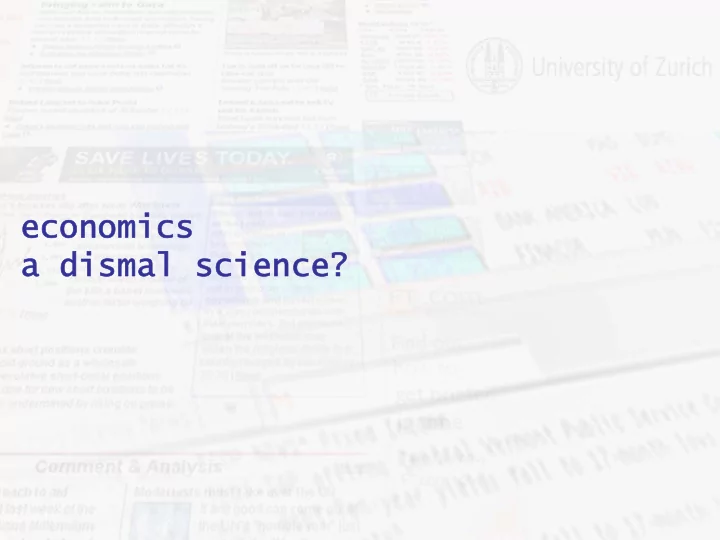

economics economics a dismal science? a dismal science?
Few people rely solely on any social science for their pleasures, and attaining a suitable level of ecstasy involves work. … It is a nuisance, but God has chosen to give the easy problems to the physicists. Lave and March (1995)
what is economics? what is economics? • economics is what economists do • study of economic interactions of human beings • core concept is exchange • integral to all life (“second nature”)
what is economics? (cont’d) what is economics? (cont’d) social sciences social sciences economics biology biology chemistry chemistry physics physics economic imperialism the real world (?)
the origins of economics the origins of economics • developed out of moral philosophy • adam smith: “an inquiry into the nature and causes of the wealth of nations”, 1776 → “positive” v. “normative” science • leon walras, gerard debreu: “the theory of value”, 1959 → neo-classical school of economics → “macro” model with microfoundations
core concepts core concepts • general equilibrium – homo oeconomicus – invisible hand/walrasian auctioneer • game and contract theory – rationality – common knowledge
current trends current trends • evolutionary economics � • behavioral economics � • experimental economics ☺ • cross-disciplinary research ☺ • econophysics � (the good, the bad, the ugly)
the future: is econ becoming a science? the future: is econ becoming a science? • questions asked • scientific methods – measurement problem – modeling problem (e.g., path dependence) – methodological v. institutional individualism (“situational analysis”)
differences between physics and econ differences between physics and econ • open v. closed systems • recurrence • stationarity • coupling • heterogeneity of “actors” • principal observer problem
some observations and some observations and candidate explanations candidate explanations • small world networks in trading • price taking v. price making • volatility clustering and long-memory effects • crashes
continuous double auction continuous double auction orders orders order book order book transactions transactions size depth price quantity granularity volatility dynamics spread
liability networks liability networks • exchange results in connection between buyer and seller → complex network of assets and liabilities → entanglement → path dependence
the principal observer problem the principal observer problem • social sciences deal with behavior → information ─ knowledge ─ action • behavior is a process • time runs from the future into the present and then back into the future again • “price taker” v. “price maker” or: • principal is observer is principal … → are we all coupled? → a “meta feedback”?
Recommend
More recommend